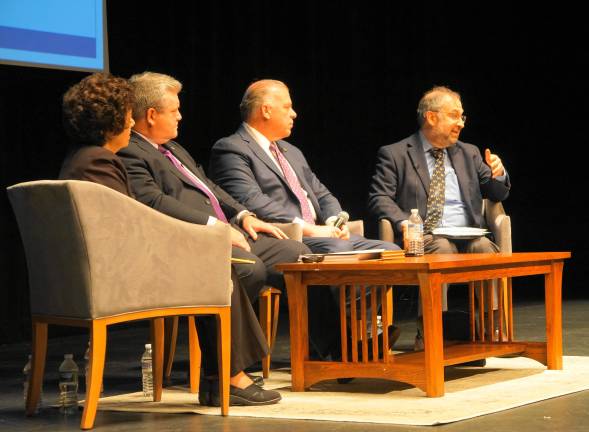Panle looks at education, shared services

In addition to looking at a potential $4 billion deficit in 2023, the Path to Progress panel discussed recommendations to fix New Jersey's problems at the Sussex County Community College Performing Arts Center Town Hall.
State Senate President Steve Sweeney (D), N.J. Senator Steve Oroho (R), and Path to Progress Economic and Fiscal Policy members Marc Pfeiffer and Former N.J. Department of Education Commissioner Lucille Davy responded to questions and comments from an audience of over 200 people.
Davy spoke of educational recommendations which came out of the N.J. Path to Progress report, including the transition to K–12 districts on a strictly voluntary basis. Above economic savings and efficiencies, she said, the recommendation is primarily about better educational opportunities for children in order to prepare every child for success in adult life.
A member in the audience called out, “We’re the best public schools in the country, Ma’am.”
“We also have some really huge gaps in performance in different parts of the state and in different districts,” Davy said.
Another recommendation, Davy said, is to transition the full responsibility for extraordinary costs of special education to the state and find ways to make the system more efficient.
On a pilot basis, she added, the Path to Progress work-group recommends giving two counties the opportunity to form a full countywide school district, once again on a voluntary basis.
Oroho said it is great to be second in the nation, but number one — Massachusetts — costs 30 percent less, at around $9 billion. He then suggested figuring out why New Jersey is spending so much more for a similar education.
Sweeney said they were not talking about shutting buildings down with the school consolidation recommendations. It was about ensuring sending districts are teaching the same curriculum, he added, utilizing the same administration for K–12.
In response to the question about how individual township district debt would be assumed in county-wide school districts, and how different school teacher salary guides would be handled, Davy said, as part of pilot programs, the debt and salary guides would be worked out on a local level.
Pfeiffer said he spent 37 years as a municipal government administrator and in the state. He added, they have studied the issues six times, of which he is aware, and the problems have been around for years.
In 2001, Pfeiffer said, the legislature, prompted by a number of organizations, decided to give a 9 percent raise to people who had already been retired, without contributing to it. He said New Jersey is still paying for that today.
Pfeiffer also said studies show small governments do things at a lower per-capita cost, because they focus on keeping costs under control. For further savings, he said, the Path to Progress group recommends pursuing more shared services with 911 emergency dispatch and municipal courts. Furthermore, they recommend municipalities and boards of education meet twice a year to discuss more cooperation and efficiency.
After being asked about shared services and people losing their jobs, Sweeney said when he was freeholder in Gloucester county, people lost their jobs through attrition, resulting in cost reductions. He also commented about the importance of the services being delivered well, and one size not fitting all.
Pfeiffer said there are 565 municipalities, with many different circumstances. He, too, emphasized the need to make sure not to impose a one-size-fits-all plan, but to provide flexibility for municipalities and towns to do the work.
In response to passing the millionaires’ tax seven times, and millionaires paying less in taxes than ever before, Sweeney said the Trump State and Local Tax (SALT) deduction raised federal taxes on the millionaires and on middle-class people in N.J. Until they get a Democrat President, Senate, and hold the Congress, Sweeney continued, the tax is not happening.
Oroho explained 1 percent of tax payers pay 40 percent of the state’s taxes — the millionaires. He said the office of legislative services said when one particular person left New Jersey, the whole state budget was impacted. Furthermore, he said, $25 billion has left N.J. since 2004, in net, without one year of more money coming into N.J. He continued,
“If we don’t change that, it’s going to continue to get worse and worse,” so he was against the millionaires’ tax.
In answer to the question, “Why do we need this plan if the state has a surplus budget,” Sweeney said a surplus is supposed to be about 8 percent of the total budget, and 3 percent is not solid.
Oroho added said New Jersey is not near a surplus basis, because the state has more liabilities than assets.